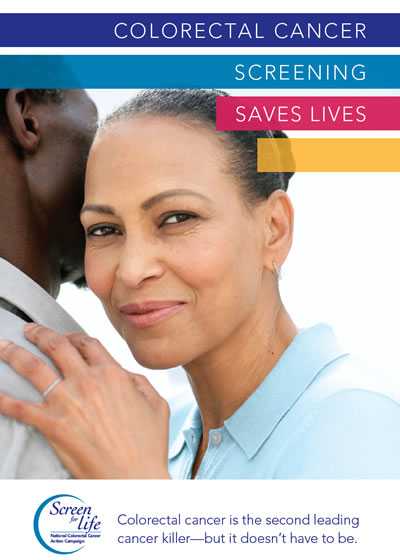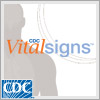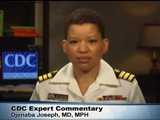Colorectal Cancer Awareness

Colorectal cancer screening saves lives. If you’re 50 years old or older, get screened!
Among cancers that affect both men and women, colorectal cancer (cancer of the colon or rectum) is the second leading cause of cancer deaths in the United States. Every year, about 140,000 Americans are diagnosed with colorectal cancer, and more than 50,000 people die from it. But this disease is highly preventable, by getting screened beginning at age 50.
Screening tests help prevent colorectal cancer by finding precancerous polyps (abnormal growths) so they can be removed. Screening also finds this cancer early, when treatment can be most effective.
What You Can Do
- If you’re aged 50 to 75, get screened for colorectal cancer regularly. If you’re between 76 and 85, ask your doctor if you should be screened.
- Be physically active.
- Maintain a healthy weight.
- Don’t drink too much alcohol.
- Don’t smoke.
Fast Facts
- Risk increases with age. More than 90% of colorectal cancers occur in people aged 50 and older.
- Precancerous polyps and colorectal cancer don’t always cause symptoms, especially at first. You could have polyps or colorectal cancer and not know it. That is why having a screening test is so important. If you have symptoms, they may include—
- Blood in or on the stool (bowel movement).
- Stomach pain, aches, or cramps that do not go away.
- Losing weight and you don’t know why.
These symptoms may be caused by something other than cancer. If you have any of them, see your doctor.
- Some people are at a higher risk than others for developing colorectal cancer. If you think you may be at increased risk, talk to your doctor about when to begin screening, which test is right for you, and how often to get tested.
- There are several screening test options. Talk with your doctor about which is right for you.
- Colonoscopy (every 10 years).
- High-sensitivity guaiac fecal occult blood test (FOBT) or fecal immunochemical test (FIT) (every year).
- Sigmoidoscopy (every 10 years, with FOBT or FIT every three years).
- Sigmoidoscopy alone (every 5 years).
- Stool DNA test (FIT-DNA) every one or three years.
- CT colonography (or virtual colonoscopy) every five years.
Screen for Life: National Colorectal Cancer Action Campaign
CDC’s Screen for Life: National Colorectal Cancer Action Campaign offers resources for patients and health professionals, including print materials (fact sheets, brochures, and posters) and television and radio public service announcements.
Spread the Word! Our Screen for Life Resource Toolkit provides quick access to materials you can print and distribute or share on social media, your Web site, or blog.
Featured Resources

Our Screen for Life Basic Facts on Screening fact sheet [PDF-396KB] explains in simple terms how screening tests can save your life.

Do you know the facts about colorectal cancer? Take CDC’s Screen for Life quiz!

These continuing education courses provide guidance and tools for clinicians on the optimal ways to implement screening for colorectal cancer.

Our “No Excuses” poster [PDF-7.7MB] responds to four people who think they don’t need colorectal cancer screening.

The “Have You Been Tested for Colorectal Cancer?” podcast explains that you can choose from three screening tests.

Our Colorectal Cancer Screening Saves Lives brochure [PDF-7.8MB] provides detailed screening information.

This Medscape video explains how doctors can increase colorectal cancer screening rates.

In this video, Terrence Howard shares how his mother’s death from colon cancer affected his family.

This formatted, ready-to-print article about colorectal cancer [PDF-67KB] is free to use in any publication.
- Page last reviewed: February 22, 2017
- Page last updated: March 23, 2017
- Content source:
- Maintained By:


 ShareCompartir
ShareCompartir